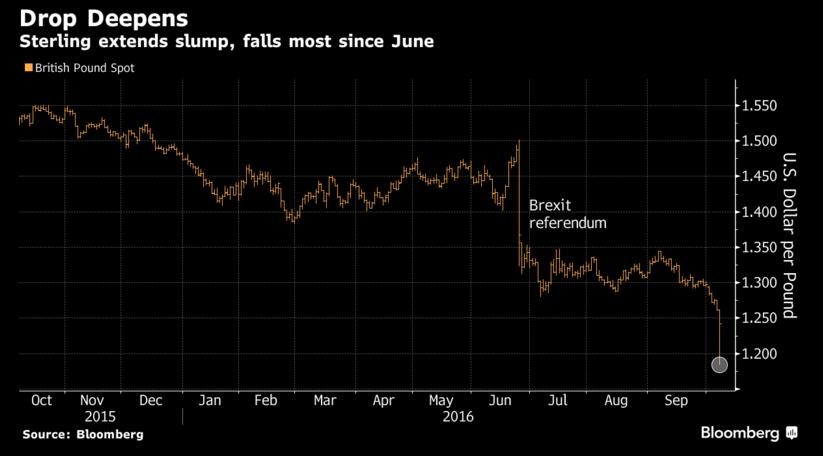What Pound's 6% flash crash means for markets

Mason Stevens
One of the main topics discussed at the UK Conservative Party's annual conference last week was how the UK will leave the EU. Prime Minister May seemed to move closer towards a so called "hard Brexit" solution that would severely restrict the UK's access to the European Union's single market, so that the UK government can have complete control over immigration policy.
Sterling has tumbled since PM May's speech, accelerating losses as she appeared to indicate that financial services companies were unlikely to receive any special favours in EU exit talks. If that proves to be the case, UK banks will lose their "passporting" rights to operate freely in the EU. Rival financial centres in Paris, Frankfurt, Dublin and elsewhere are keen to gain a competitive edge over their UK rivals and are lobbying for such a result within the EU.
With March next year now set as the deadline for triggering formal divorce proceedings, tensions are playing out in the currency market. At the time of the pound's "flash crash" on Friday the Financial Times had reported that President Hollande, speaking at a Paris dinner attended by EU officials, urged the EU to lead tough negotiations with Britain to avoid contagion and protect the fundamental principles of the EU's single market.
The pound has dropped 16% since the June referendum to leave the world's biggest single market. For 2016 to date, sterling is the worst-performing currency among 31 major currencies tracked by Bloomberg. Sterling is already much lower than when George Soros and other short sellers famously forced the pound out of the European Exchange Rate Mechanism in September 1992. The only time sterling has been weaker against the USD was after the UK's deep recession of the early 1980s when Margaret Thatcher was Prime Minister. At its lowest point the pound stood at just USD 1.052 in February 1985.
UK-listed companies such as Unilever (ULVR.LSE), GlaxoSmithKline (GSK.LSE), Diageo (DGE.LSE) and Reckitt Benckiser (RB.LSE) are examples of companies that have been benefiting from the sterling devaluation. However, for unhedged foreign investors in the UK equity market, the equity gains have been largely offset by the currency losses.
With a number of investment bank macro teams forecasting further downside risk for sterling the pounding may not yet be over.
Written by Marcus Tuck, Head of Equities at Mason Stevens.
4 topics

Responsible for identifying domestic and international equity investment opportunities. 25 years of financial markets experience as an equity strategist, economist, analyst, portfolio manager and consultant.
Expertise

Responsible for identifying domestic and international equity investment opportunities. 25 years of financial markets experience as an equity strategist, economist, analyst, portfolio manager and consultant.

